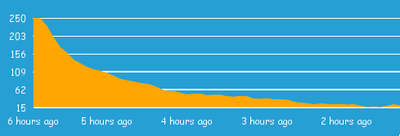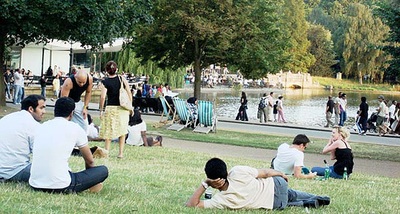“Why do you Twitter?” someone once asked me. “Why would anyone twitter? It seems completely pointless when you can just socialize like a normal person.”
But that’s exactly the point of Twitter. It’s part of the phenomenon of social media, after all.
Ah, social media: the child of the Internet. The sharing of information and knowledge with strangers, through websites and software that form connections across the entire membership. Pervasive and sometimes invasive, and above all inevitable, because humans are socially driven creatures.
Social media can be described as promiscuous, and often has, but it’s more like hanging out in the park—a shared space. Shared space is a very human thing to want; hanging out is practically an instinct with us. So you can people watch or not. You can contribute noise or simply sit back. You can choose to chat with only friends or to kibitz with strangers.
Not simply a few in a chat room, or a few hundred in a forum, but thousands of them, all at once. It’s not just writing a list and posting it on a corkboard in the Hufflepuff Common Room, but actual real-time communication across a huge audience. Maybe no one is really listening, but tens of thousands of them can hear you, tens of thousands of people you’ve never met In Real Life.
And they can respond to you, interact directly with you. Physical degree of separation, as in all things online, no longer matters. Offline, you can’t even begin to approach that level of broadcast communication, a dialogue that flows in both directions. Not even rock concerts or press conferences cut it.
And perhaps that’s where some of the bafflement comes in. Why can‘t you just talk to people you know? But that can lead to a rather isolated life. At some point you have to talk to people you don’t know….
And there’s additional value in talking to strangers.
I tend to think of Twitter as the best example of social media there is. All those words floating in the ether belong to the people posting, even if it’s just 140 characters at a time.

It’s not like simply sharing bookmarks. Twittering is instantaneous contribution. And never underestimate the impact of size—it’s far more impulsive and easier than blogging.

And it’s not quite like forums, because forums imply some kind of order in the manner of threads and sub-fora.

Twitter on the other hand is amorphous and chaotic, even if you only listen to the people you follow rather than the entire Twitter timeline.

Twitter’s restriction of 140 characters is sometimes considered a curse, but it’s enough (and not too long) for the efficient aggregation of real thoughts, short as they are, as opposed to bookmark echoes.

Not to mention that you can get more personal, nuanced trending here than the Digg front page will give you. To me, this is the most fascinating aspect of Twitter.

Whenever the Dow moves, Twitter’s heart skips a beat.
Warren Ellis once penned a comic book series, The Global Frequency, about normal people using distributed methods—which is just my academicy essayey way of saying webcams, wireless, and massive online communication over long distances—to accomplish great, world-saving things. More impressive than anything I’ve ever seen on Heroes when it comes to concept, even with Hiro’s awesome time traveling hijinks. To me, it echoes of Twitter.

In fact, Twitter is often the first warning I have about events of wide, or very wide, interest. The passage of the eye of Hurricane Ike, tracked in detail by witnesses, complete with the communication of way stations and shelter information for those in the way of the storm. The bailout, both in the US and elsewhere, and reactions of either outrage or depressed acceptance. The trailing fall of the U.S. stock market, the banks of Europe, and Iceland’s insolvency.
It’s not all dire: there’s the live discussions during the debates and the Tina Fey Saturday Night Live skits. Steve Jobs’ fake heart attack and the upcoming Apple gadget love-in.
Twitter is a true global frequency.

And Now, Salutations.
Thanks for reading to the end, and I hope it was fun and not quite so bitter. There are more links about Twitter below, as per my usual blogging customs.
Anyways, hello there. I’m now a blogger for Tor.com, which I totally did not intend, but circumstances have carried me along and so I go willingly with them. I’m happy that people, including the folks here, think my words are amusing, and so I hope to amuse you.
I carry nothing in my pockets with respects to any official status in the field of SF&F. I am a wanderer, albeit a wanderer with my Kindle in hand, across this land and that of the ever-boggling Internet, which I do count eBooks as part of. My mind overfills with this stuff, and sometimes I write about it. I try to write about it often, for fear that my head will explode otherwise.
I’m thinking of in the next few posts discussing the demon lover, what makes for good cross-platform eBooks, and the horrible things that Sherlock Holmes fanfiction pastiche writers get up to when they Cross the Streams with Science Fiction.
Oh, before I forget. Here’s my Twitter account.
Until next time, have some links.
More Twitter Links
If you want to start twittering, register at Twitter.com and read the official Getting Started guide.
You can look at your timeline and tweet from the Twitter website, but there are many Twitter clients to download, available across all platforms, including embedded ones and browsers. My favorite isn’t listed on the official Twitter site—it’s TwitterFox, a Firefox extension.

There are multiple Twitter aggregation/trending sites out there, but I’m especially fond of TwitScoop, since they additionally tweet emergent trends.

For my WordPress blog at home, I use Twitter Tools to cache and display my Tweets down the side. For everywhere else, there’s Twitter’s official badge widgets.
Many of the staff and bloggers on the Tor.com also Twitter. Come find us.

Even websites have their own Twitter accounts that they post updated to, including @tordotcom, @sfsignal, and @io9, and of course Boing Boing.
Some of my favorite people (and “people”) to follow: @TwitterLit, @novelsin3lines, @stephenfry, @MarsPhoenix, @BadAstronomer, @BarackObama, @Othar, @wilw, @warrenellis.

[Images of Hyde Park, London by banootah_qtr and Itchen Bridge by Rhys Jones Photography, CC-licensed for commercial use.]










